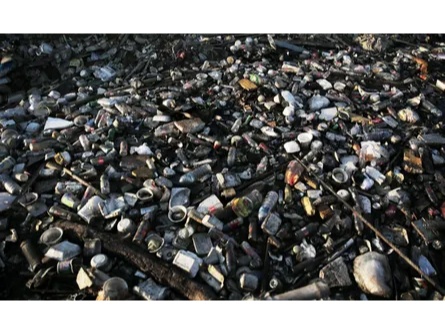
Microplastic pollution causes significant damage to populations of soil-dwelling mites, larvae and other tiny creatures that maintain the fertility of the land, research has found.
The study notes that discarded bags, cups, threads and other forms of plastic waste are concentrated more in the earth than the oceans, with similarly dire consequences for the abundance of species that live below the surface.
Mites, roundworms, springtails and other forms of microarthropod and nematode are barely visible to the human eye, but they play an essential role in recycling carbon and nitrogen and breaking down organic matter into a form that bacteria can consume.
They are increasingly threatened by oil-based synthetic refuse. The new paper, published in Proceedings of the Royal Society, notes that humanity has produced 6,300 million metric tonnes of plastic waste since 1950, of which 79% has accumulated in landfills or leaked into the natural environment.
The authors conducted what they say is the first ever field study of how this is likely to affect the abundance of microarthropods, nematodes and micro-organisms such as fungi and bacteria.
The scientists divided a plot of subtropical land in Jinfoshan, Chongqing in China into six blocks, each containing four test areas. Each area was deliberately contaminated with four different densities of low-density polyethylene fragments: zero, 5, 10 and 15 grams per sq metre. After leaving the plastic to seep into the soil for 287 days, the researcher collected five samples and counted the species found inside.
At the highest level of plastic contamination, they found a significant decrease of the most common species, oribatid mites (down 15%), and even greater declines of three other arthropods – Diptera (fly) larvae (down 30%), Lepidoptera (moth and butterfly) larvae (down 41%) and Hymenoptera (ants) (down 62%) – in comparison to the control plots. Among nematodes, they found a reduction of 20%.
Although bacteria and fungi were relatively unaffected, the paper concludes “the effects of microplastics strongly cascade through the soil food webs, leading to the modification of microbial functioning with further potential consequences on soil carbon and nutrient cycling”.
The authors call for further study at different depths and in other environments, but say the message for policymakers and consumers is clear: “We call for a reduction in the use of plastics and to avoid burying plastic wastes in soils, as this may bring adverse ecological consequences on soil communities and biogeochemical cycling in terrestrial ecosystems.”
63 days to save the Earth …
… we’re all in. Are you? On November 4, a day after the presidential election, the US will formally withdraw from the Paris agreement on constraining global heating. It’s urgent that we tell the world what this means, and the Guardian is pulling out all the stops to do so. Will you help us by supporting our journalism?
Millions are flocking to the Guardian every day. Financial support from our readers is crucial in enabling us to produce open, fearless, independent reporting that addresses the climate emergency. It helps sustain the freedom we have to present the facts comprehensively, explain the details as they unfold, and interrogate the decisions made.
The Guardian recognises the climate emergency as the defining issue of our times. That’s why we have pledged to give climate change, wildlife extinction and pollution the sustained attention and prominence they demand, as a core part of our journalism.
At this pivotal moment for our planet, our independence enables us to always inform readers about threats, consequences and solutions based on scientific fact, not political prejudice or business interests. This makes us different. And we are equally determined to practice what we preach: we have divested from the oil and gas sectors, renounced fossil fuel advertising and committed to achieving carbon neutrality by 2030.
We believe everyone deserves access to information that is fact-checked, and analysis that has authority and integrity. That’s why, unlike many others, we made a choice: to keep Guardian reporting open for all, regardless of where they live or what they can afford to pay. Our work would not be possible without our readers, who now support our work from 180 countries around the world.
SOURCE: The Guardian.

